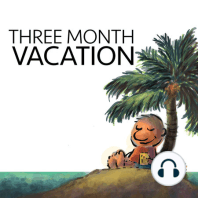19 min listen

The Number One Deal Killer (When Making A Sale)
The Number One Deal Killer (When Making A Sale)
ratings:
Length:
18 minutes
Released:
Feb 23, 2015
Format:
Podcast episode
Description
We often wonder why the sale gets killed. Why the customer walks away. Sometimes it's because we're doing a lousy presentation. Or we forget the facts. But often, we get everything perfectly right. And then it's time to ask for the deal. And we freeze. We get needy. We hope the neediness helps to get some empathy. And in reality, it kills the deal. Or at least puts us in a weak spot. So where does this neediness show up? And how do barriers help to avoid being needy? Workshop: http://www.psychotactics.com/dc Speaking at Copyblogger: http://www.psychotactics.com/denver Contact me: sean@psychotactics.com Zany newsletter: http://www.psychotactics.com Time Stamps 00:00:20 Introduction 00:02:25 Table of Contents: Status and Urgency 00:04:27 The Story of 5000bc.com 00:07:58 How Good Should You Be To Put Up Barriers? 00:10:02 Increasing Level of Barriers 00:12:43 Final Announcements Transcript Sean D'Souza: Hi, this is Sean D'Souza from psychotactics.com, and you're listening to the Three Month Vacation Podcast. This podcast isn't some magic trick about working less. Instead, it's about how to really enjoy your work and enjoy your vacation time. You've probably heard of Pilates, but maybe not of Joe Pilates. Who was Joe Pilates? He was the guy who started up the Pilates system, except when he got to the United States he wasn't that popular, so he rented a studio right under the studio of some dancers. They would practice, and as you'd expect, as you dance more frequently you get more injuries. Joe's system, of course, would make sure that you were more fit. Now the important part is that he didn't have any clients. Yet, when someone called in and wanted to make an appointment, this is what he'd say: I can't work with you right now. I'm busy and you'd have to wait for a couple of weeks. He was busy. He was busy doing nothing. That makes no sense, does it? Why not take someone who's willing to pay right now instead of waiting for a couple of weeks when they could change their mind? That's the whole point about neediness. If you are needy that's a deal killer. That's the number one deal killer no matter what you're selling, whether it be a service, a product, a workshop, just about anything. If you are needy, it's going to go down in flames. Why is neediness so bad? There are two reasons why neediness is terrible, and the first is that it reduces your status. The second is that it derails urgency. Let's talk about status for a second. We don't even have to go very far to look for examples of neediness. Let's say a friend of yours wants to go for ice cream, and they get needy at that point in time. They are trying to convince you to come for ice cream and you're not that keen on going for ice cream. Immediately their status level goes down and your status level goes up. They need you to come along. You don't need to go. But at the same time, the second factor kicks in, which is urgency. They want to have that ice cream right now, so the more urgent it is, the more they're going to pull you and the less urgency you feel. Yes, you might say, "Fine, we'll go for the ice cream," but notice how your status level has increased. Notice how your urgency has decreased. Whenever we're selling anything, the moment we're needy it doesn't work for us. We think that the buyer is going to feel a little empathy for us, they're going to feel a little sorry for us, but something else happens. A switch turns in their heads and suddenly they don't feel any urgency. They don't feel the need to buy anything from us. Instead, what happens is the other person, they feel this need to pull out. That is just human nature. The moment we feel that we're in control and the other person is not in control, we don't feel the need to go ahead and follow their agenda. We th
Released:
Feb 23, 2015
Format:
Podcast episode
Titles in the series (100)
Unusual Time Management Ideas: Three Slightly Odd Ways To Getting Things Done by The Three Month Vacation Podcast